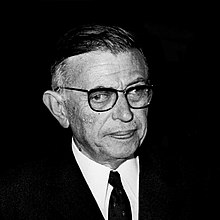1964 Nobel Prize in Literature

The 1964 Nobel Prize in Literature was awarded the French writer Jean-Paul Sartre "for his work which, rich in ideas and filled with the spirit of freedom and the quest for truth, has exerted a far-reaching influence on our age."[1]
Sartre declined the prize, saying that he never accepted any official honours and that he did not want the writer to become an institution. The Swedish Academy said in announcement: "It will be recalled that the laureate has made it known that he did not wish to accept the prize. The fact that he has declined this distinction does not in the least modify the validity of the award. Under the circumstances, however, the Academy can only state that the presentation of the prize cannot take place."[1] It is the only known occasion when a Laureate has voluntarily declined to accept the Nobel Prize in literature.[2]
The Laureate[]
Jean-Paul Sartre is known for having formulated and popularized the philosophy existentialism. His best known work include the play Les Mouches, novels such as La Nausée, short stories and philosophical works.[3]
Nominations and prize decision[]
76 individuals were nominated for the Nobel Prize in literature in 1964. On 17 september 1964 the Nobel committee proposed that the prize should be awarded to Jean-Paul Sartre. The second name on the list was Mikhail Sholokov (who was awarded the prize in 1965) and the third name was W.H. Auden. There was some ambivalency within the Swedish Academy to award Sartre. He had been nominated the first time in 1957, but his candidacy was postponed for the future as the Academy was not sure if Sartre's work would have any historical importance. His candidacy was considered and postponed again in 1962 for similar reasons. The publication of Les Mots in 1963 is believed to have strengthed Sartre's candidacy and in October 1964 the Academy decided to award Sartre, their decision was sealed with a final vote on 22 October 1964. A week earlier Sartre, knowing that he was a candidate for the prize, had sent a letter to the Swedish Academy saying he would not accept the award, but as the Academy had already made their decision before the formal final vote they disregarded the letter. The Academy's permanent secretary Karl Ragnar Gierow replied to Sartre's letter saying that the decision had already been made and urged Sartre to reconsider and accept the prize.[2]
Reactions[]
In a text published in Le Figaro on 23 October 1964 Sartre wrote that he regretted that his refusal to accept the prize had caused a scandal. He explained that he never accepted any prizes or membership of institutions as he believed an author who accepted such things became forever associated with the prize or institution, and that the author should not allow himself to become an institution.[2]
Aftermath[]
In his memoirs Lars Gyllensten claimed that someone, either Sartre himself or someone related to him, in 1975 had contacted the Swedish Academy and asked if the prize money was available.[2]
References[]
- ^ a b Nobel Prize in Literature 1964 nobelprize.org
- ^ a b c d Kaj Schueler Sartres brev kom försent till Akademien Svenska Dagbladet 2 January 2015 (in Swedish)
- ^ Jean-Paul Sartre nobelprize.org
External links[]
- Jean-Paul Sartre
- Nobel Prize in Literature